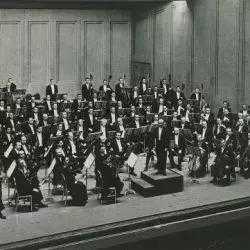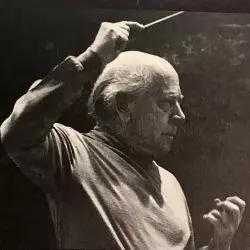A1 - The Washington Post March
A2 - Grand Walkaround
A3 - Bess, You Is My Woman Now
A4 - Fanfare For The Common Man
A5 - Variations On "America"
A6 - How-Down
B1 - The Stars And Stripes Forever
B2 - American Salute
B3 - On The Trail
B4 - Camptown Races
B5 - The Star-Spangled Banner

American symphony orchestra based at the Kimmel Center for the Performing Arts in Philadelphia, Pennsylvania. It is one of the "Big Five" US orchestras. For chorus credit use The Philadelphia Orchestra Chorus. The orchestra was founded in 1900 by Fritz Scheel, who also acted as its first conductor. In 1907, Karl Pohlig became music director and served until the orchestra cancelled his contract. Leopold Stokowski became music director in 1912 and brought the orchestra to national prominence. Under his guidance, the orchestra gained a reputation for virtuosity, and developed what is known as the "Philadelphia Sound". In 1917 Stokowski lead the Orchestra in its first sound recording for the Victor Talking Machine Co. Philadelphia became the first orchestra to make an electrical recording in April 1925, with Camille Saint-Saëns' Danse Macabre. Later, in 1926, Victor began recording the Orchestra at The Academy of Music . Stokowski led the ensemble in experimental long-playing, high-fidelity, and even stereophonic sessions in the early 1930s for RCA Victor and Bell Laboratories . Stowowski and the orchestra recorded the soundtrack for Walt Disney's Fantasia in multi-track stereophonic sound in 1939-40. Stokowski left the orchestra in 1941, and did not return as a guest conductor for nearly 20 years. In 1936 Eugene Ormandy was appointed co-conductor with Stokowski and was given the title of music director two years later in 1938. He remained as music director until 1980, after which he became Conductor Laureate. Ormandy conducted many of the orchestra's best-known recordings, remaining with RCA Victor through 1942. Following a settlement of a recording ban imposed by the American Federation of Musicians, the Orchestra joined Columbia Records in 1944. The orchestra returned to RCA Victor in 1968 and made its first digital recording, Bartók's Concerto for Orchestra, for RCA in 1979. The Orchestra has also recorded for EMI and TELDEC. Ormandy took the orchestra on its historic 1973 tour of the People's Republic of China, where it was the first Western orchestra to visit that country in many decades. Upon the retirement of Eugene Ormandy, Riccardo Muti became the fifth music director of The Philadelphia Orchestra from 1980 through 1992. Muti's recordings with the orchestra included the symphonies of Beethoven, Brahms, and Scriabin, for the EMI and Philips labels. Wolfgang Sawallisch succeeded Riccardo Muti as the sixth music director from 1993 to 2003, and he was named Conductor Laureate, and held the title until his death in 2013. Sawallisch made a number of recordings with the orchestra for EMI, however, the orchestra lost its recording contract with EMI during this time, which led to a musicians' strike in 1996. In January 2001, Christoph Eschenbach was announced as the Orchestra’s seventh music director; his tenure began with the 2003–2004 season. In December 2001, The Philadelphia Orchestra performed inaugural concerts in its new home at The Kimmel Center. In May 2005, the Orchestra announced a three-year recording partnership with the Finnish label Ondine, the Orchestra's first recording contract in 10 years. In October 2006, Eschenbach and the orchestra announced the conclusion of his tenure as music director in 2008, and Charles Dutoit began a four-year tenure as chief conductor of The Philadelphia Orchestra. In June 2010, Yannick Nézet-Séguin was appointed Music Director Designate, and in 2012, he was appointed music director, succeeding Dutoit, who subsequently was named conductor laureate of the orchestra.

Eugene Ormandy, rodným jménem Jenö Ormandy Blau byl maďarsko-americký dirigent a houslista. Proslavil se především nastudováními pozdně romantického repertoáru a hudby z počátku 20. století. Ve 14 letech absolvoval na Budapešťské královské akademii, v oboru hry na housle. Vedl ho zde Jenö Hubay. V 17 letech se stal profesorem hry na housle. Záhy měl úspěšné turné po Evropě. Dostal nabídku na turné i po USA, kam skutečně odjel, ale vše se zvrtlo, Ormandy se dostal do finančních problémů a musel vzít místo houslisty v orchestru divadla Capitol, který doprovázel zde promítané němé filmy. V roce 1924 se stal dirigentem tohoto orchestru, což odklonilo jeho kariéru právě k dirigování. Živil se hlavně nahrávkami populárních úseků z klasických děl pro rozhlas. Na jednom letním koncertu pod širým nebem zaujal Arturo Toscaniniho, který vedl těleso Philadelphia Orchestra. Ten mu nabídl místo svého zástupce. To byl zlom v Ormandyho kariéře. V letech 1931-1936 pak vedl Minneapolis Symphony Orchestra. Roku 1936 se vrátil k Filadelfským symfonikům, nejprve sdílel jejich řízení s Leopoldem Stokowskim, od roku 1938 je vedl sám - a to až do roku 1980.
Objednávkám nad 699 Kč
Sběratelské kusy i knižní novinky
A s radostí
Za hotové a s vlastním odvozem